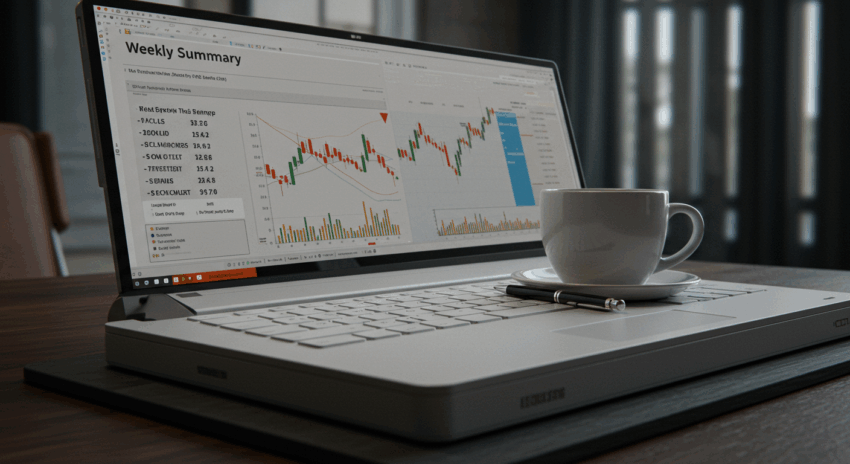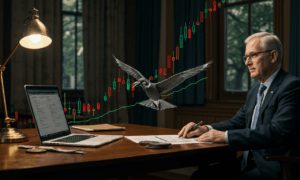ECONOMY
This week, the economic world was fixated on two major interconnected events in the United States: the release of new inflation data and the subsequent decision by the central bank on interest rates.
- Inflation Shows Signs of Cooling: The latest Consumer Price Index (CPI) report, a key measure of inflation, brought some welcome news. It showed that the overall rate of price increases for goods and services was slightly lower than economists had predicted for May. This suggests that the relentless rise in the cost of living might be losing some steam, offering a bit of relief for household budgets. While inflation is not yet back to the ideal target, this downward trend is a positive signal for the economy’s stability.
- The Federal Reserve Remains Cautious: Following the encouraging inflation report, the Federal Reserve—the central bank of the U.S.—concluded its policy meeting. As widely expected, they decided to keep their main interest rate unchanged. However, the bigger news was in their projections. Officials signaled that they now anticipate making only one interest rate cut in 2024, a reduction from the three cuts they had projected earlier in the year. This indicates a patient and watchful approach, as they want to see more consistent evidence that inflation is firmly under control before making it cheaper to borrow money.

FINANCE
In the corporate finance sphere, technology-driven growth and political uncertainty abroad captured the headlines, impacting company valuations and market sentiment.
- Political Uncertainty Rattles European Markets: A surprise call for a snap legislative election in France sent tremors through European financial markets. The potential for a significant political shift caused investors to become nervous, leading to a notable drop in French stocks and an increase in the borrowing costs for the French government. This serves as a clear reminder of how closely intertwined politics and financial stability are, with political events often causing immediate market volatility.
- Chipmaker Broadcom Soars on AI and a Stock Split: Riding the powerful wave of demand for Artificial Intelligence technology, semiconductor company Broadcom reported very strong earnings. The company, which makes critical components for AI infrastructure, also announced a 10-for-1 stock split. This means each existing share will be split into ten new ones, making the price per share lower and more accessible to individual investors. The combination of stellar AI-related performance and the stock split announcement sent its share price surging higher.
INVESTMENTS
For investors, the week was dominated by major developments at two of the world’s most-watched technology giants, highlighting the immense impact of AI strategy and corporate governance.
- Apple Reclaims Top Spot with AI Push: After unveiling its long-awaited strategy for Artificial Intelligence, dubbed Apple Intelligence, Apple saw its stock price climb dramatically. Investors reacted with enthusiasm to the company’s plans to integrate AI features across its suite of products, including the iPhone. The surge was so significant that Apple briefly overtook Microsoft to once again become the world’s most valuable publicly traded company, showcasing how a promising new technology strategy can have a massive and immediate impact on investor confidence and market valuation.
- Tesla Shareholders Back CEO’s Massive Pay Package: In a closely watched corporate vote, Tesla shareholders approved a controversial, multi-billion dollar compensation plan for CEO Elon Musk. The vote of confidence resolves a period of uncertainty surrounding the CEO’s future leadership and focus, which some investors feared might be divided among his other ventures. The approval is seen as a major win for Musk and is expected to keep his attention firmly on guiding the electric vehicle maker’s future growth and innovation.
Frequently Asked Questions (FAQ)
Why would the Federal Reserve reduce its plans for rate cuts if inflation is getting better?
It’s a matter of confidence and consistency. While one month of lower inflation is good news, the Federal Reserve wants to see a sustained trend of cooling prices over several months. They are acting cautiously to avoid cutting rates too early, which could cause inflation to spike again. By signaling only one potential cut, they are communicating that they need more data to be fully convinced that the battle against high inflation has been won.
Does a 10-for-1 stock split mean a company is suddenly ten times more valuable?
No, not at all. A stock split does not change the fundamental value of a company. Think of it like exchanging a $10 bill for ten $1 bills. You have more pieces of paper, but the total value is still $10. Similarly, after a 10-for-1 split, an investor who owned one share worth $1,000 will now own ten shares worth $100 each. The primary goal is to lower the individual share price to make it more attractive and psychologically accessible for a wider range of investors.



